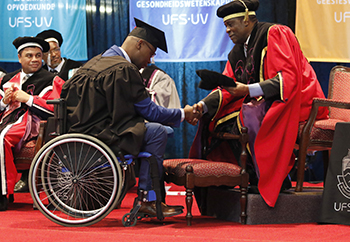Latest News Archive
Please select Category, Year, and then Month to display items
29 August 2024
|
Story Anthony Mthembu
|
Photo Harmse Photography
 Ross van Reenen, CEO of the Toyota Free State Cheetahs.
Ross van Reenen, CEO of the Toyota Free State Cheetahs.
The Business School at the University of the Free State (UFS) recently hosted the CEO of the Toyota Free State Cheetahs, Ross van Reenen, for a guest lecture. Van Reenen presented the guest lecture in the Business School Auditorium on the UFS Bloemfontein Campus on 21 August 2024.
Reflecting on Van Reenen’s address
In a lecture addressed to an auditorium filled with UFS staff and students, Van Reenen’s talk was divided into several sections. Firstly, he spoke about the concept of the ‘black swan’ in reference to the book written by Nassim Nicholas Taleb, titled The Black Swan: The Impact of the Highly Improbable. Referring to Taleb’s book, Van Reenen defined a ‘black swan’ as a rare event that has a severe impact, and the occurrence of which people try to explain. He used some examples to explore this concept as well as its implications, including COVID-19 and its impact on the world, and the tragic death of the people in the Titanic disaster. However, he delved deeper into 9/11 and the extent of its impact, saying that “9/11 was a major wake-up call in the world economy”. Van Reenen highlighted how some companies such as Barclays, for which he previously consulted, had to work to be up and running after the collapse of the Twin Towers in 9/11.
In addition, Van Reenen’s lecture also touched on the importance of the first ninety days of a job after an individual has been employed. “Those first ninety days are crucial, as you have to establish yourself in a company where you are paid less than you are worth,” Van Reenen said. As such, he gave the audience insight into what they could focus on in that time frame. This includes focusing on the small wins, as well as ensuring that you are working at keeping the team together, as the team is an integral part of an organisation.
Van Reenen concluded his address by speaking about his time as the CEO of the Toyota Free State Cheetahs, including some of the decisions he took to ensure the success of the organisation.
Largest number of CUADS graduates at UFS
2017-07-03

During the mid-year graduation ceremonies at the
University of the Free State (UFS), the Centre for
Universal Access and Disability Support (CUADS) saw
the largest number of students with disabilities graduating.
Photo: Johan Roux
During the mid-year graduation ceremonies at the University of the Free State (UFS), the Centre for Universal Access and Disability Support (CUADS) saw the largest number of students with disabilities graduating.
For the first time since being established in February 2001, a total number of 30 students graduated, of which seven were postgraduate students.
Accomplishing your dreams as a student
Martie Miranda, Head of CUADS, says that one cannot help but become emotional with joy and happiness. “The feeling of satisfaction we feel with the graduates is so valuable, because it’s a reminder of their abilities to accomplish their dreams just like any other student.”
CUADS aims to ensure that the UFS creates opportunities for students with disabilities, aiming to become a higher-education institution recognised for its efforts in human reconciliation. Together with the Exam Division, CUADS coordinates alternative assessment with an accessible test and examination facility housed at CUADS. This accommodates students with concessions, amanuensis, specialised equipment, and accessible formatted papers.
Changing the challenges you experience
Miranda continuously encourages students to keep going. “If being successful is important to you, you will find a way to change the challenges you experience into opportunities. Either to learn something about yourself or teach someone else something.”
Below are the number of graduates from each faculty:
• Faculty of Law: 2
• Faculty of Economics and Management Sciences: 4
• Faculty of Education: 4
• Faculty of Natural and Agricultural Science: 9
• Faculty of the Humanities: 11